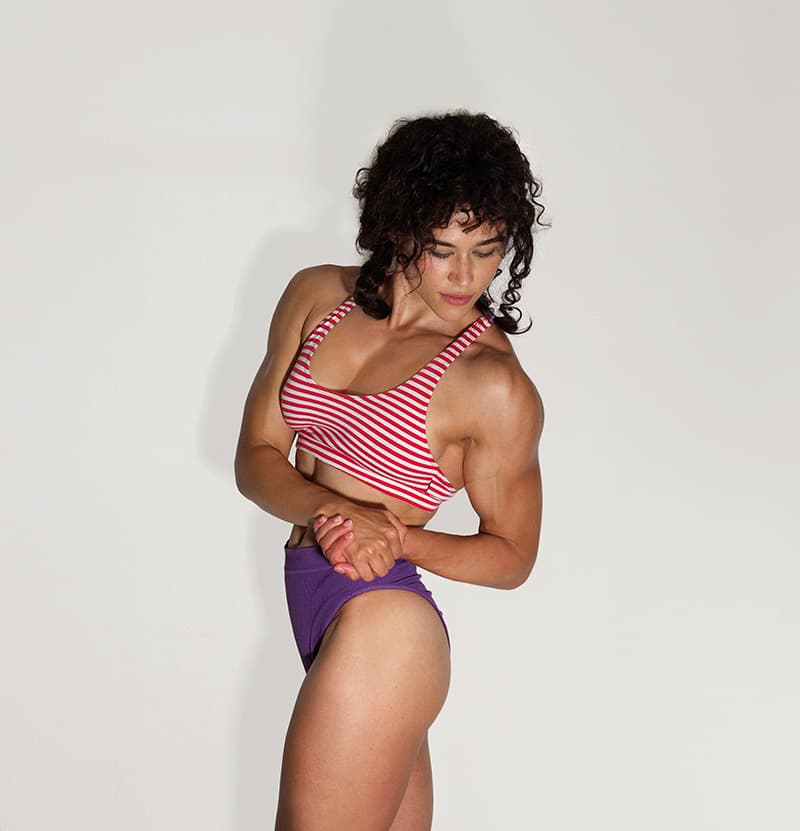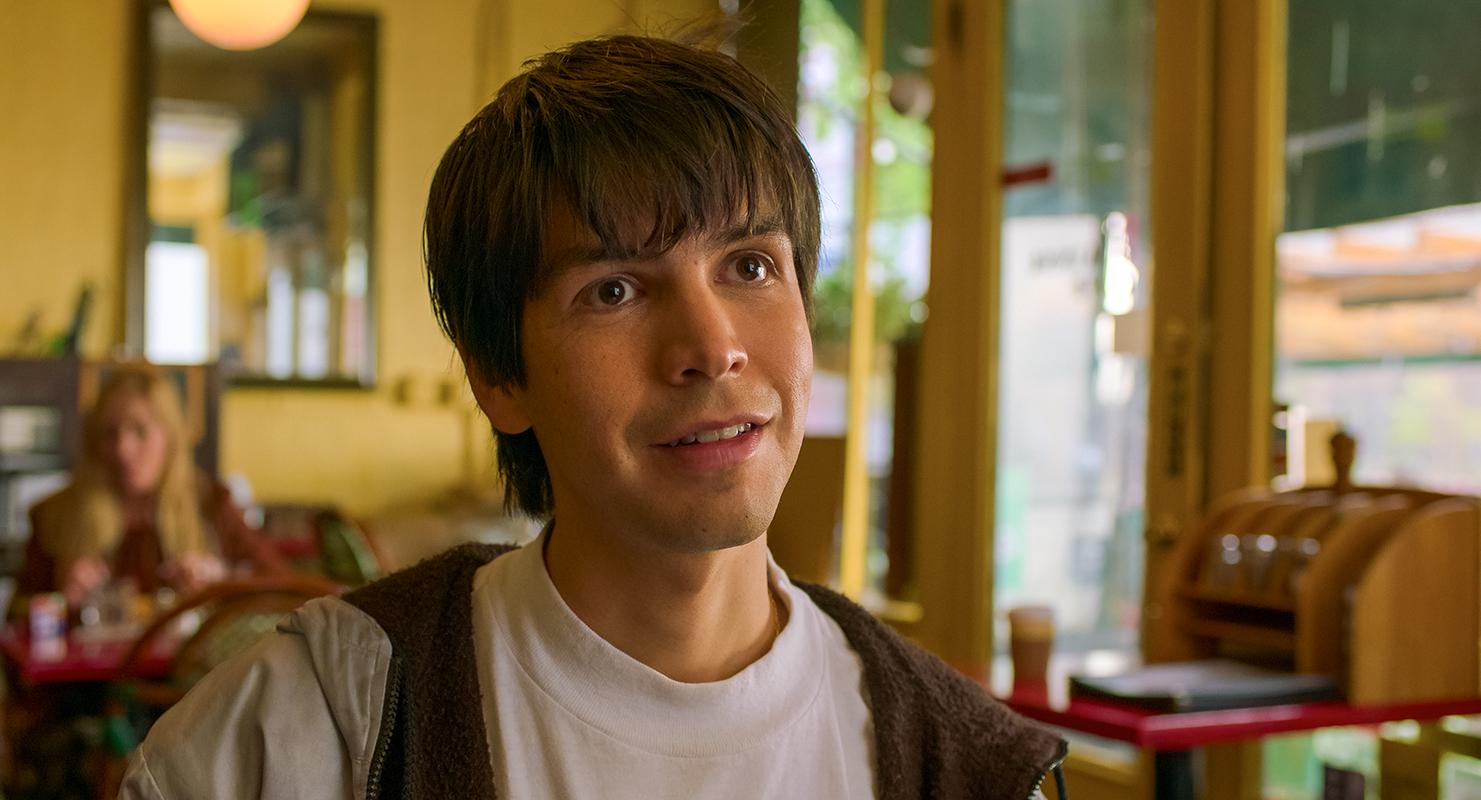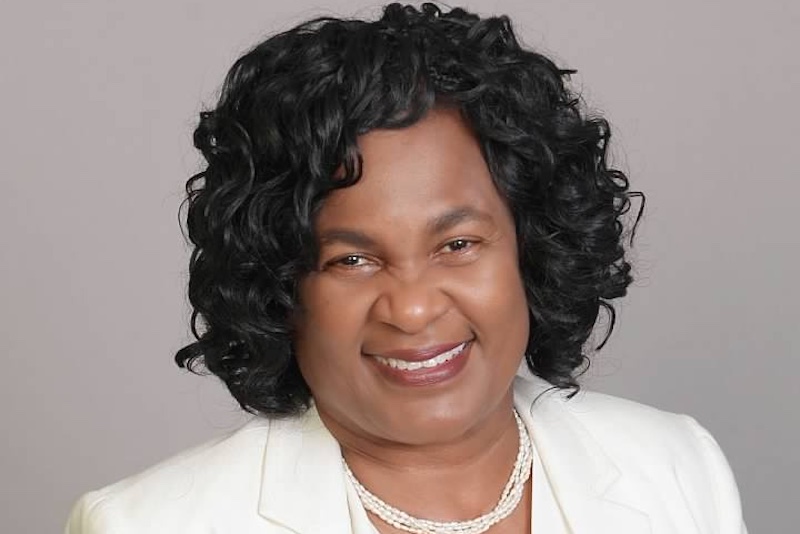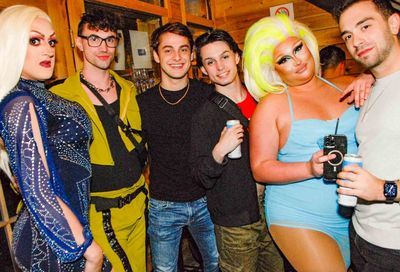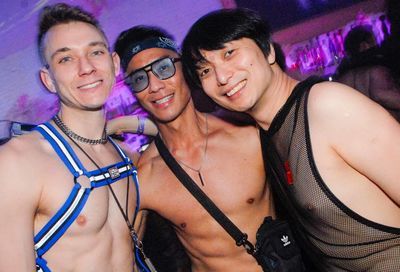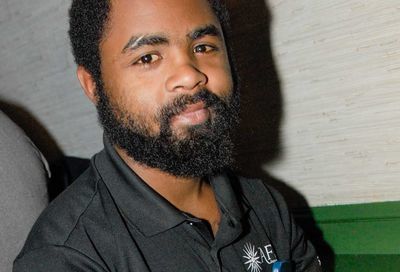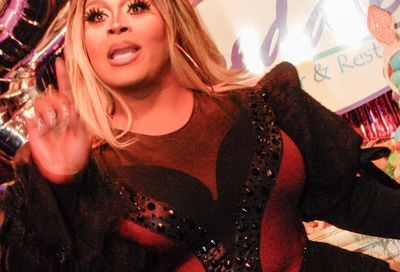Blonde Ambition
Morgan Fairchild discusses Mrs. Robinson, her life in television, and the role of celebrities in social activism
One could almost say Mrs. Robinson is the original desperate housewife. But there’s nothing desperate about the woman currently playing her on The Graduate‘s national tour.
When you look over the career of the actress who, in the ’80s, claimed her fame on television with prime time soaps like Flamingo Road, Falcon Crest and, briefly, Dallas, you can’t help but notice she’s spent the past twenty years or so guest-starring on virtually every popular T.V. sitcom. From Mork and Mindy to Friends to Cybill to Murphy Brown to her groundbreaking stint as Sandra Bernhard’s lipstick lesbian lover on Roseanne, Fairchild has found a moment in the spotlight on each.
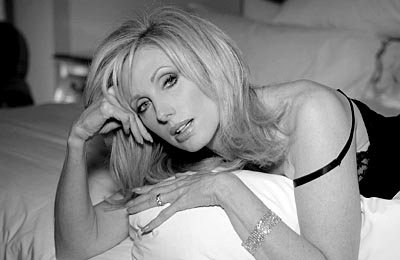 Morgan Fairchild |
Born in Dallas, Tx., in 1950, Fairchild originally had an interest in the sciences, but with her glamour looks and natural comic timing, quickly moved into acting. Little known fact: she was Faye Dunaway’s double in Arthur Penn’s 1967 classic Bonnie and Clyde, and you can see her in the long shots (“If it’s far enough away you can’t be sure it’s her,” says Fairchild, “it’s not. It’s me.”)
In the ’80s, Fairchild combined her interest in retro-viruses with her celebrity stature and became known for being one of the first Hollywood celebrities to speak up for AIDS funding and education. It was, as she puts it, ill-advised by some at the time, but staying silent was not Fairchild’s nature. She remains outspoken about AIDS, issues surrounding a woman’s right to choose an abortion, and, to a lesser extent, the subject of a constitutional amendment banning gay marriage.
Fairchild acknowledges that, at 55, she’s of “a certain age,” and rails against the rampant ageism in Hollywood. But she sees hope in shows like Desperate Housewives, which offer juicy parts to slightly older actresses, and in Hollywood’s increasing trend to deglamourize the most glamorous of actresses (see Charlize Theron: Monster).
For now, however, the stage — and Mrs. Robinson’s seductive nature — suits this blonde’s ambition just fine.
METRO WEEKLY: Let’s start by talking a little about The Graduate. How’s did the tour come about for you?
MORGAN FAIRCHILD: They had talked to me about doing this play before, when it was in London, and then when it was on Broadway. I always seemed to have a conflict when they wanted me to do it. [For this tour], the timing worked out and it’s been a good experience. I was a bit dubious about eight shows a week, going out on the road and everything, but it’s been a lot more fun that I thought it would be.
MW: What qualities do you bring to Mrs. Robinson?
MORGAN: I bring a lifetime of experience. The odd thing is that when the movie came out, I would have been right to play the daughter. Now I’m Mrs. Robinson and I’ve lived the life that enabled me to play Mrs. Robinson. So I bring a wealth of experience to it of, I guess, being kicked around by the world. She seems very complicated — stress, strain, unhappy, on some levels angry, smart and funny and witty, even if she is only saying things to amuse herself. There’s a lot going on with her. It’s just always much more interesting to play someone like this than an ingénue.
MW: But you’ve certainly played plenty of those during your career. While researching your life, I couldn’t help but notice your varied stated interests beyond acting, including your passion for paleontology.
MORGAN: When I was a kid, I wanted to be a paleontologist. I’ve been fortunate enough to make a living at acting — and I love acting but it can be a small world if that’s all you’re interested in. I was blessed with — or cursed with — a voracious curiosity about things. I love reading on all kinds of different subjects, and I think as long as you’re growing intellectually, you don’t get old. There’s just always so much more to find out about in the world.
There’s just a lot of things I read that I guess that average people are not interested in. For example, I’m really interested in emerging viruses and epidemiology, things like that. And then, once in a while, some of the odd things that you’re interested in become of interest to the general public. Something like AIDS, which I have been following since 1979. Or terrorism, which I have followed since the ’70s. But most people aren’t interested in either of those topics until something big happens. Then they suddenly wake up and sort of take an interest in it. And the little bit of stuff that you’ve managed to accumulate in your brain may be of use to someone.
MW: Such as AIDS. You were among the first celebrities to speak about the growing epidemic in the ’80s.
MORGAN: At the time, everybody told me I definitely shouldn’t get involved in the AIDS issue. One national magazine — I won’t mention the name — wanted to do an article on AIDS in ’85 with celebrities, and everybody had turned them down, including some people who were major activists. When I said yes, I was the linchpin in getting other people to come aboard. Because I was a hot blonde at that time, and the fact that I said yes would make it safe for other people to climb on board. Back then, [AIDS] was one of those things people really said “Don’t touch this with a ten-foot pole. This could hurt your career.”
But I’m proud of those things where I was willing to take a chance and stick my neck out in 1985 on topics like AIDS. Everybody warned me not to get involved in [talking about AIDS] — my agents, PR people, everybody, but I knew a lot about the virus. And I knew I was probably the only recognizable face at the time in Hollywood who could go on Nightline and talk about what a retrovirus is and how it works in layman’s terms so that people could understand and try to take some of the stigma and backlash away from it, and get it treated as a disease and not some kind of social issue.
MW: Do you think that it’s useful for celebrities to come forward and raise the general public’s awareness on various issues?
MORGAN: Well, it helps if the celebrity is informed on the subject and is not just being used for their name. In the ’80s, I think it was important for recognizable faces to be out there because [AIDS] was controversial. At that time I felt it was a moral obligation to try to get out there and educate people on this particular disease because of all the backlash [against gays] that was going on in the country, and also because there really wasn’t much funding. And we needed funding. It was important to get people to understand that this would not stay in an isolated community that some people found easy to stigmatize, that this was going to be a problem. I remember saying even in my congressional testimony back then that if something wasn’t done, this could set back the continent of Africa for generations because it would prevent them from moving forward economically. It would take away whole generations of workers just as they were getting educated and able to move forward. Unfortunately, that’s mostly what’s happened.
MW: We’ve made certain amounts of progress, but still have a long way to go. Now with the evidence of unsafe sex again on the rise…
MORGAN: What’s very disheartening for early activists like me is that so much progress on so many levels has been made — certainly in research, certainly in funding on certain levels, and certainly for a long time in safer sex and education and outreach — and now to see now a lot of people throwing caution to the wind, saying “Oh, it’s just a disease and you can treat it” or whatever their reasoning, to see that backsliding is disheartening. To see people ignore that after all the work and all the death and all of the money and all the research and all the time and all the effort — to see people willingly commit suicide, basically, is very disheartening.
MW: Do you feel there’s a risk people won’t take you seriously on issues like this because of your celebrity?
MORGAN: There’s always a risk they don’t take a celebrity seriously. And the only weapon a celebrity has to be taken seriously is to be very well informed, to be articulate and to present the case well. If you go in and you don’t know what you’re talking about, you say stupid things and it makes all of us look bad. To that end, I really try not to get involved with things I don’t have a good working knowledge of, things that I can’t articulate.
MW: You’re also pro-choice. Has that stance caused you any grief?
MORGAN: I get harassed a certain amount for that. People send me ugly letters and pig’s blood and little pig fetuses in the mail. To me, abortion is a medical procedure and it should be clean, safe and available and used as infrequently as possible. I’m all for teaching abstinence in school. I’m all for teaching birth control in school. I’m all for teaching sex education in school so kids understand the process and the repercussions. I’m for all levels of education about everything and not just one. So when I say I’m pro-choice, I am not for abortion, I am pro- making it a safe, legal, medical procedure that’s available to women who chose it, but that no one is forced to have. I’m all for support systems that enable women to keep their babies if they want to and enable them to raise them properly.
MW: What’s your stand on the gay civil rights movement?
MORGAN: I’m certainly for equal protection. But I haven’t really gotten into the marriage issue. The gay friends I’ve talked to seem to be sort of equally divided about it. Some feel that civil unions that offer protection is plenty and then some are quite rabid about wanting to be able to get married. I understand both sides. I just respect whatever people want to do with their own lives. I don’t understand why people seem to feel so threatened about gay marriage. I would think people would be thrilled that anybody in this day and age wants to make a commitment.
MW: What do you think about President Bush’s support for a constitutional amendment banning gay marriage?
MORGAN: I’m not keen to see people changing or adding constitutional amendments. I think [gay marriage] is really and truly something Americans need to sit down and have real heart-to-heart open discussions about and try to understand each other. I think it would be good to have a national discussion, try to come to terms, try to understand each other. But I don’t see the need for a constitutional amendment.
MW: Do you remember the first time a gay person came out to you and what your reaction was?
MORGAN: I don’t remember the first time. I started in the theater when I was ten, and I had a gradual realization that I had a lot of friends in the theater that were he, she and other. You just start realizing that it’s a lot more complicated than it seems to be on the surface.
I’ve worked with actors who didn’t want to admit, at least publicly, that they were gay and I knew they were gay, but that’s their business. It’s everybody’s private business. If people want to come out, that’s great and if they need a while to come to terms with themselves, that’s fine. It’s a very, very personal issue.
MW: You appear to have quite a large gay following.
MORGAN: I am a big Barbie Doll, you know. I have had gay men in love with me, gay men who wanted to marry me, who have said that they would go straight for me. And I would have to gently say to them, “Honey, I don’t think it’s going to work out.”
MW: Your television work has outweighed your film work. Was that by choice?
MORGAN: It’s not by choice. I would have always loved to do more film work. But I’m a very practical person. I work where they offer me work. I remember back in the ’80s I had a young girl fan who would write to me and offer me career advice. I got one letter from her where she wrote, “I just saw this movie and I think you really made a mistake in turning down Sophie’s Choice.” I had to write back to her and say, “You know, I didn’t make that mistake. They didn’t offer it.” A lot of people in the public think that if you are an actor, you are making all these career decisions like some deity, where the reality is that we’re just puppets. We can only do what we’re offered. There’s a lot of different things that go into a company’s decision or a producer’s decision and who they offer things to. I just haven’t gotten offered as many movies as I would like. But I haven’t given up hope on that, as I move into a slightly different age bracket, some different parts will come my way.
MW: Non-glamour parts.
MORGAN: You know, I got famous doing glamour parts. The good side is, you get offered glamour parts. And the bad side is, they don’t offer you anything else. You get stereotyped with it, and then they won’t let you even come in and read for something that has your hair in a bun and no makeup and big, thick glasses because they don’t see you as an actor anymore, they see you as a personality, they see you as an image. And so that makes it difficult. Also, right now, there’s a lot of ageism in the business. Everything’s geared to 15-year-olds. I mean I have girlfriends who are 25 in L.A. who are lying about their age because people tell them they’re too old. That’s how pathetic it is.
MW: Some actresses panic as they get older and overdo it with the facial surgery, the results being often worse than before they went under the knife.
MORGAN: I’ve tried to tread a happy medium there. You know, you certainly come to grips with [getting older] when you’re doing a nude scene, and not everything is where it used to be 20 years ago. Now, that’s okay, it’s just not going to be. I work out like mad, I watch my diet, but you realize that these hormones die and some of these things are going to shift around. It’s just not going to be the same. But I’m not going to panic about it, I’m not going to freak about it, I’m not going to let it run my life. I don’t want to be stretched so that I look like a trampoline with my face trying to break through.
I know what you’re saying, though. I think some surgeons do their clients a disservice by making them so tight. But, you know, somewhere between the two lies a happy medium. If we’re going to live to be 100, you want to look good as long as possible, but looking good doesn’t mean you have to try to look sixteen.

MW: Did you have any reservations about the nude scene in The Graduate when you took the part?
MORGAN: Oh, absolute terror. But you get over the terror by knowing that it’s in the contract and you’ve got to do it. The first night there’s an audience there, you just sort of take it all off and go on stage and pray that the lights are dim enough and kind enough and the scene is short enough that people don’t run screaming from the theater in horror and will accept you for what you are at this age.
MW: Okay, no one is going to run from screaming from the sight of a naked Morgan Fairchild. You’re still a sex symbol and there’s a good portion of the audience purely coming to the show to get a glimpse of you in the buff.
MORGAN: Well, then, I hope they come for the nudity and leave having thought that it was a good comedy. You look out and you see the binoculars in the second row and you realize that they are probably looking at other things, too. You know they’re just checking you out for wrinkles and cellulite. I can’t believe anyone would want to see me naked at this age, but hey, if they do, and it’s part of the show, what are you going to do? The fact that anybody would actually pay money to get a glimpse of my naked body is thrilling.
MW: There’s sort of an automatic “camp” value attributed to you. Mainly because of some of the older prime time soap operas, like Flamingo Road and Falcon Crest.
MORGAN: Honey, I built in a lot of it into those shows. When I did the pilot of Flamingo Road it was a straight soap opera. I camped my way through it and sort of added that dimension to it. Made it jump off the screen, as did Joan Collins with Dynasty.
Quite frankly, in the early days of the AIDS problem, [my camp value] was one of the things I felt I could actually offer when I would go to hospice care. I opened the first veterans AIDS wing with Mayor Koch in New York. When I would go and visit people in hospice, some of the [gay] guys wanted to know eye makeup tricks. And, you know, that campiness helps people get through the tough times. It can be a touch of humor, a touch of the old days, a touch of the over-the-top, a touch of whatever, and if that’s what you can offer to people — a bit of humor and levity and fun — then I’m happy to bring that.
MW: Say we were giving out Lifetime Achievement Awards right now. How would you want people to remember you?
MORGAN: Well, you know, when I was a kid I was fortunate enough to work with a wonderful actor who sort of summed up acting to me. And it’s how I’d like to be remembered, too. He always just said, “Acting is reaching out in love to your fellow man.” And that’s how I’ve tried to conduct my life — personally, privately, in the theater, in all my efforts at lobbying, reaching out to each other in love. That’s what it’s really all about, so I just hope that people will remember that in spite of all the campiness, at least Morgan Fairchild was a kind broad.
The Graduate, starring Morgan Fairchild, runs from Feb. 22-27 at The Warner Theater, 513 13th Street NW. Tickets are $34 to $64. Call 202-397-7328 or visit www.warnertheatre.com.
Support Metro Weekly’s Journalism
These are challenging times for news organizations. And yet it’s crucial we stay active and provide vital resources and information to both our local readers and the world. So won’t you please take a moment and consider supporting Metro Weekly with a membership? For as little as $5 a month, you can help ensure Metro Weekly magazine and MetroWeekly.com remain free, viable resources as we provide the best, most diverse, culturally-resonant LGBTQ coverage in both the D.C. region and around the world. Memberships come with exclusive perks and discounts, your own personal digital delivery of each week’s magazine (and an archive), access to our Member's Lounge when it launches this fall, and exclusive members-only items like Metro Weekly Membership Mugs and Tote Bags! Check out all our membership levels here and please join us today!




